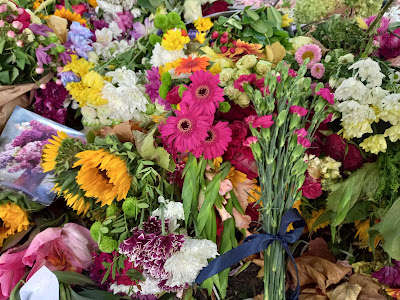Expecting the pandemic to be over after a year or so. Remembering the situation in India right now.
Now we have passed the year into the pandemic, I wonder if this same time limit is being applied? For much of the first year, our conversations have often been more caring, more thoughtful, checking in on each other. Fourteen months on, there is a sense of impatience, of this pandemic taking so much longer than we planned for and of wanting to put happier things into our diaries now. I understand this desire for normal... for live music surrounded by the warm energy of others, for a yoga class where I can actually hear my dear yoga teacher's calm voice in person. I feel the same pull for life to grow back, yet I wonder if our expectation of the pandemic being well and truly over fairly soon is realistic?
Just as grief takes more than a year to go through all the painful stages, perhaps so does a pandemic? In my experience of dealing with loss, the first year was not the most difficult. It was the second. The second year involved getting severe shingles, at exactly the time when I told myself I had to be back to normal. I spent six weeks in excruciating pain, exhausted with such blistered skin across my arm that you could barely see any normal skin left. Even getting dressed and making my way to the kitchen was a major achievement. My body hadn't been given the time to adjust to all these multiple losses, so it forced the situation. I have learned the hard way that healing can take longer than we think.
As the pandemic rolls into the second year, I am hearing about how in England we are "nearly over covid" or adverts suggesting we can book a spa retreat this summer "post-pandemic". It reminds me of trying to condense grief into a year and failing. What if it is true that the pandemic will not be over imminently and that it is sadly going to continue to rage out of control in parts of the world into this second year. How do we cope with this? Do we just tune out, turn off the news and forget about it in the relative comfort of our half-vaccinated country? Or just roll our eyes saying that we are sick of this virus now, let's talk or write about something else we sigh?
 |
| In India, at the orphanage (age 18) |
My heart is filled once again with compassion and an overwhelming sense that I must do something to help. Is it enough to simply donate regularly to charities that are working in India in this crisis? It is only a small step, but it gives me a glimmer of hope. The Hope Foundation has managed to open 53 beds now in a small hospital in Kolkata (which are all full to covid patients). They cater for those who would unable to access medical care. Just as I was treated with kindness from many during my time in India, I return the kindness to a small number of those in need. And when this all feels too much, I imagine that some kind of giant mother, or love is circling and holding India in her arms, just as a mother would her child that is in pain. In that warm embrace, I hope that those feeling forgotten, scared or without access to medical care or oxygen, have someone who can be with them. Because it is one thing to be ill and vulnerable, but another to be unseen or alone.
I especially hold in mind: My sponsor daughter, Sristi living with her family in the plains of Nepal just over the border from India.
My previous sponsor daughter, Nara-Maya (now 20) also in Nepal.
And the children I got to know well (now adults) from the Polio Centre in Tamil Nadu, India: Anthony, Murigan, Prakash and Pratimabee.













This was one of your best articles! And I was touched to hear about your compassion towards India and the children that you know.
ReplyDelete